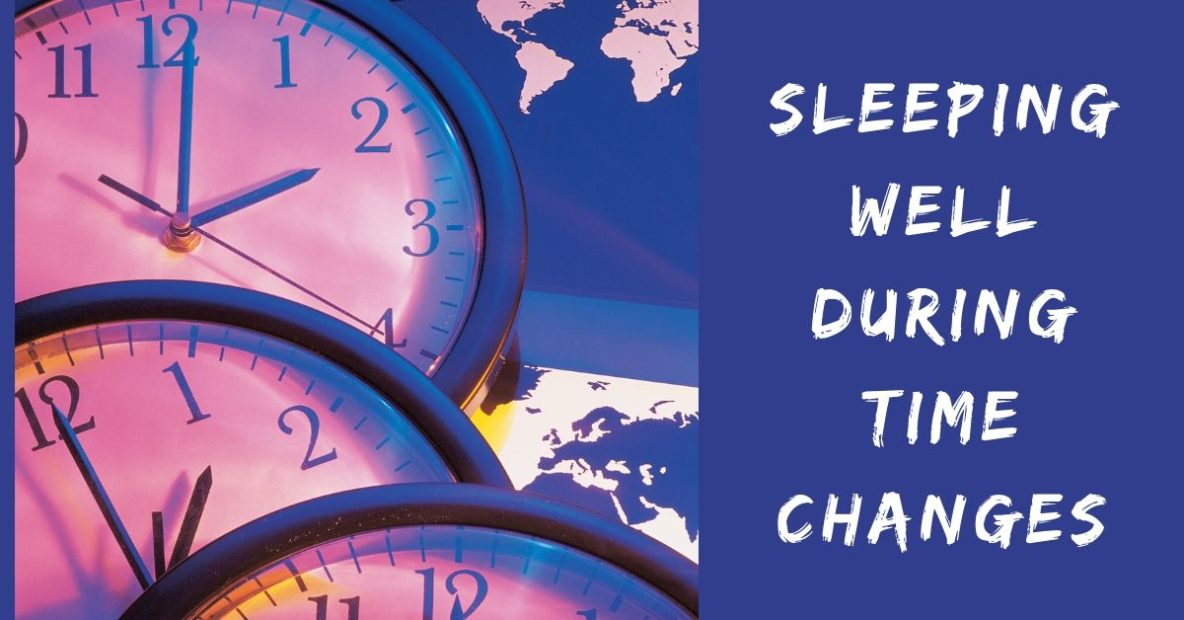Sleeping Well During Time Changes

- A Promising Paradigm Shift: New Research Challenges the CPAP-First Approach to OSA Treatment - September 5, 2023
- Understanding Sleep Meditation Techniques - July 30, 2021
- How Online Learning Has Affected Sleep for Students - July 13, 2021
We’re all enjoying the long summer days, but daylight saving time will be ending in just a few weeks. When we move the clocks forward in the spring, and reset them back in the fall, our sleep cycle is disrupted, and it takes a few days to reset our body clocks. This fall, follow these tips to sleep well during the time change.
How Time Changes Affect Your Body
Adjusting to a new time can be very hard on your sleep, and the sudden change in sleep patterns disrupts your sleep. Setting the clock back an hour, or traveling to a different time zone, might change the time on the clock display, but doesn’t change your internal clock. This internal clock, your circadian rhythm, keeps ticking on at the same time, and if you’re used to waking up at a certain time, you’ll keep waking at that time regardless of what the clock says. Changing the internal clock isn’t as easy, but with the right steps you can reset your circadian rhythm and wake up and fall asleep at the right times without feeling groggy and tired.
Don’t Rush Your Body
Adjusting to a new time is easier if you make the change gradually. You won’t be able to suddenly fall asleep or wake up an hour earlier or later than you’re used to, so plan ahead and start to make adjustments to your sleep patterns before the day you set your clock back. Start with small changes of 10 to 15 minutes every few days, and give your body time to adjust to sleeping and waking a bit earlier or later. When you finally change the clock, your body will already be used to the new time, and the time change won’t take a toll on your sleep.
Get Enough Sun
Sunlight, or blue light, has a major effect on your sleep, promoting wakefulness. Getting more sun in the morning will help you wake up earlier, since this will signal your body to stop producing melatonin, the hormone that helps you sleep. If you need to stay awake longer, get out into the sun in the late afternoon or evening, and delay the production of melatonin.
Use Essential Oils or Natural Sleep Aids
Another way to adjust to the new time is to use essential oils to relax and fall asleep more easily. You and use an air diffuser or place a few drops on your pillow or sleep mask to help you sleep at night. The best essential oils for relaxation and deep sleep include lavender, jasmine, rose, sandalwood, and chamomile.
You can also use melatonin as a natural sleep aid, and you can use if for a few nights around the time change to help you fall asleep easily and get the rest that you need.
Time Changes While Traveling
Daylight saving isn’t the only time we change the clocks, and traveling to different time zones can also be hard on your circadian rhythm. Before a trip, plan for the new time zone, and if you’re traveling for work try to arrive a day early to give your body a chance to adjust. If you know you’ll arrive tired, but need to stay up a few more hours until the evening, take a nap before your flight, or sleep on the plane so that you’ll be able to adapt to the new time zone more easily.
Sound Sleep Medical
Getting 7 to 9 hours of sleep every night, especially around daylight saving time, can be a challenge. Do you struggle with disturbances in sleep, have a hard time falling asleep at night, or wake up repeatedly during the night? Don’t live with less sleep, or suffer the consequences lack of sleep which include fatigue, irritability, mood swings, anxiety, increased stress, depression, and trouble focusing or concentrating on tasks.
Visit us today at Sound Sleep Medical and find out what’s keeping you awake. We’ll analyze your sleep, and help you discover what’s preventing you from getting the sleep you need. Whether you have sleep apnea or poor sleep hygiene, we’ll help you get a great night’s sleep every night, so you can feel energetic and enjoy your days and your nights.
